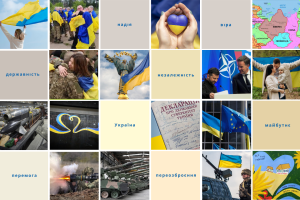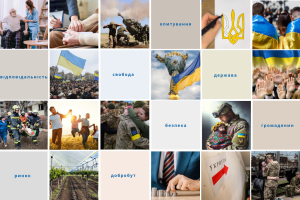This nationwide public opinion survey was conducted by the Ilko Democratic Initiatives Foundation and Kyiv International Institute of Sociology on November 4-19, 2019 in all regions of Ukraine (110 locations), excluding the Russian occupied Ukrainian territory of Crimea and occupied territories of Donetsk and Luhansk oblasts. 2,041 respondents, aged 18 years and older, were polled. The sample error doesn’t exceed 2.3%.
Survey was funded by EU Delegation to Ukraine
For comparative analysis we also present results of the polls conducted with Razumkov Center (June 13-20, 2019 and August 16-22, 2018) and Kyiv International Institute of Sociology (August 9 – 18, 2019).
In November 2019 36% Ukrainians believed that Ukraine was developing in the right direction, while 39% had opposite opinion. The right direction of the country’s development was supported by majority of political party “Servant of People” voters (50% of them shared this view while only 25% thought country was developing in the wrong direction). Meanwhile majority of the people who had voted for “Opposition Platform – For Life” party (69%) and “European Solidarity” party (74%) thought that direction of country’s development was wrong.
Just after parliamentary elections people were more confident about direction of country’s development: In August 50% of Ukrainians believed that country was progressing in the right direction, while only 23% thought the direction was wrong. Although current level of social optimism is lower, it’s still much higher than before elections: in August 2018 only 11% of Ukrainians believed that Ukraine was developing in the right direction while 72% were sure that country was on the wrong track.
Citizens have been confident about their choice during presidential elections: 69% of respondents were sure that they had made right decision in both rounds of presidential elections, 7% stated that their choice was good only in the first round and 5% thought they voted right in the second round, while only 7% said they had made wrong choice in both rounds. Confidence in their votes was expressed by supporters of the main contenders and it remained unchanged since August 2019.
Ukrainians were even more confident about their choice during parliamentary elections: 82% said they made right choice while only 5% stated their choice was bad. Confidence in right choice was expressed by majority of people who voted for parliamentary parties.
When asked about reasons that persuaded them to vote for certain political party people mentioned: sharing of same ideas and policy proposals (44%), supporting party leadership (33%), looking for new parties and reset of politics (25%), believing that party would affirm voters' interests (20%).
At the same time only 29% of respondents knew who was elected in their majority districts while 68% had no idea about their majority district MP. Indeed, the smallest share of people (13%) who knew their MPs was among those who did not vote in parliamentary elections. However, only minority of people, who voted for parties that won parliamentary elections, knew their MPs, elected in the majority districts e.g.: only 37% among supporters of “Servant of People” party, “Opposition Platform – For Life” party and “European Solidarity” party.
41% of citizens had negative attitude toward newly elected parliamentarians who did not have political experience, 24% thought that absence of such experience was a virtue, and 26% considered that lack of experience could be either good or bad, depending on MPs willingness to engage professionals and experts to the policy making process. In this respect public opinion has changed since August, when only 25% of respondents said that absence of political experience was disadvantage for MPs while 35% considered it an advantage and 26% thought it could be both.
Absence of political experience is perceived negatively among people who voted for “Opposition Platform – For Life” party (68% considered it disadvantage and only 13% as advantage) and “European Solidarity” party (73% considered it disadvantage and only 12% as advantage). On the other hand, people who voted for “Servant of People” party were divided: 36% thought that lask of experience was advantage, 25% considered it was disadvantage and 31% said it could be both.
In general Ukrainian society was not unanimous about one-party majority in the parliament. 40% of respondents endorsed such majority and 40% did not support such outcome of elections. Negative attitude toward one-party parliamentary majority was dominant among voters of “Opposition Platform – For Life” party (71% had negative attitude and 17% - positive attitude) and “European Solidarity” party (79% had negative attitude and 11% - positive attitude). One-party majority enjoyed support among “Servant of People” party: 59% of voters supported it while 24% didn’t.
Majority of Ukrainians (62%) approved first policy decisions of president Volodymyr Zelenkyi (19% completely approved and 43% moderately approved) while 24% disapproved them, which is two times as much as in August.
Among president’s actions, approved by majority of people were:
His initiative to start talks with Russian president Volodymyr Putin about peace resolution in Donbas (75% approved and 15% disapproved);
His order to withdraw troops from the contact line (59% approved and 26% disapproved);
His decision to grant Ukrainian citizenship to foreigners who fought for Ukraine (61% approved and 17% disapproved);
His initiative to re-open dialogue with Poland about bilateral historic issues (63% approved, 10% disapproved),
His intention to legalize amber extraction (71% approved while 13% disapproved);
Complete replacement of Central Election Commission members (49% approved, 13.5% disapproved).
In the other hand there were decision that people did not like:
Intention to establish market of farmlands and abolish ban on farmlands sales (58% disapproved and only 24% approved);
Plans to continue privatization of big state enterprises (55% disapproved, 22% approved);
Intention to legalize gambling business (49% disapproved while 38% approved).
It should be admitted that a lot of Ukrainians did not care about initiative to call early municipal elections in Kyiv (39%) or had no specific opinion about this matter (20%).
When asked about president’s top five priority policy initiatives respondents mentioned: ceasefire in Donbas (74%), increase of living standards of people like wages and pensions (51%), decrease of communal utility payments (37%), punishment of corrupted officials (35%), curbing oligarchic intervention in politics (28%).
People tended to evaluate positively actions of the parties which they elected to the parliament: 41% had positive assessment and only 11% assess parties’ actions negatively (other respondents either did note vote or voted for parties that failed to win seats in the parliament).
However, relative majority of Ukrainians (47%) was dissatisfied with the work of Verkhovna Rada, only 34% said they approved work of the parliament. The most dissatisfied were supporters of the “Opposition Platform – For Life” party (74% dissatisfied and 16% satisfied) and “European Solidarity” party (75% dissatisfied and 15% satisfied). Meanwhile majority of people who voted for the “Servant of People” party were satisfied with parliament’s work (51% satisfied and 30% dissatisfied).
Most Ukrainians were confident that the new parliament will last for the full term (43.5%), although some 33% thought there would be early elections and 23% had no opinion on this matter.
Majority of Ukrainians said that elections in 2019 were free and fair (53% said elections were completely free and fair and 30% admitted that some irregularities did not altered final results of elections). Only 5% of respondents said that there were serious violations of law during elections and 2% believed that elections were falsified. It is worth mentioning that in August 2018 only 17% of Ukrainians believed that elections would be free and fair while 40% worried that election campaigns would face certain trouble and 29% thought that elections would not be free and fair at all.
10% of Ukrainians admitted that they were engaged in civic activity while 87% said they did not.
Absolute majority of the citizens (70%) said that activities of the NGOs were necessary during election campaign (40% said it was “very welcomed” and 30% - «moderately welcomed). On the other hand, only 18% said that NGOs activities were unnecessary and 8% said they were completely unnecessary .
Survey respondents believed that the most useful NGOs activities during elections were: reporting about violation of laws and electoral rights of citizens (51%), oversight of vote counting (56%), control over parties expenditures (17%), conduct of exit poll (16%).
73% of Ukrainians were aware about murder of civic activist Kateryna Handziuk.
Only 9% of respondents thought that law enforcement agencies managed case of murder of Kateryna Handziuk efficiently, while 74.5% said this case was failure. 89% of Ukrainians said that investigation of Kateryna Handziuk murder is personally important for them while 6% said this investigation was not important.
People believed that investigation of crimes against civic activists was a primary responsibility of prosecution office (66%), police (57%) and courts (38%).
84% of Ukrainians thought that attacks on civic activists is a real national issues. Therefore majority of citizens (77%) believed that it was dangerous to be civic activist in Ukraine while only 14% said it was safe to be engaged in civic activities.
Although only 34% of Ukrainians heard about civic commemorative initiative “Who ordered murder of Kateryna Handziuk ?”, 85% of people supported such initiative and 5% did not supported it.








